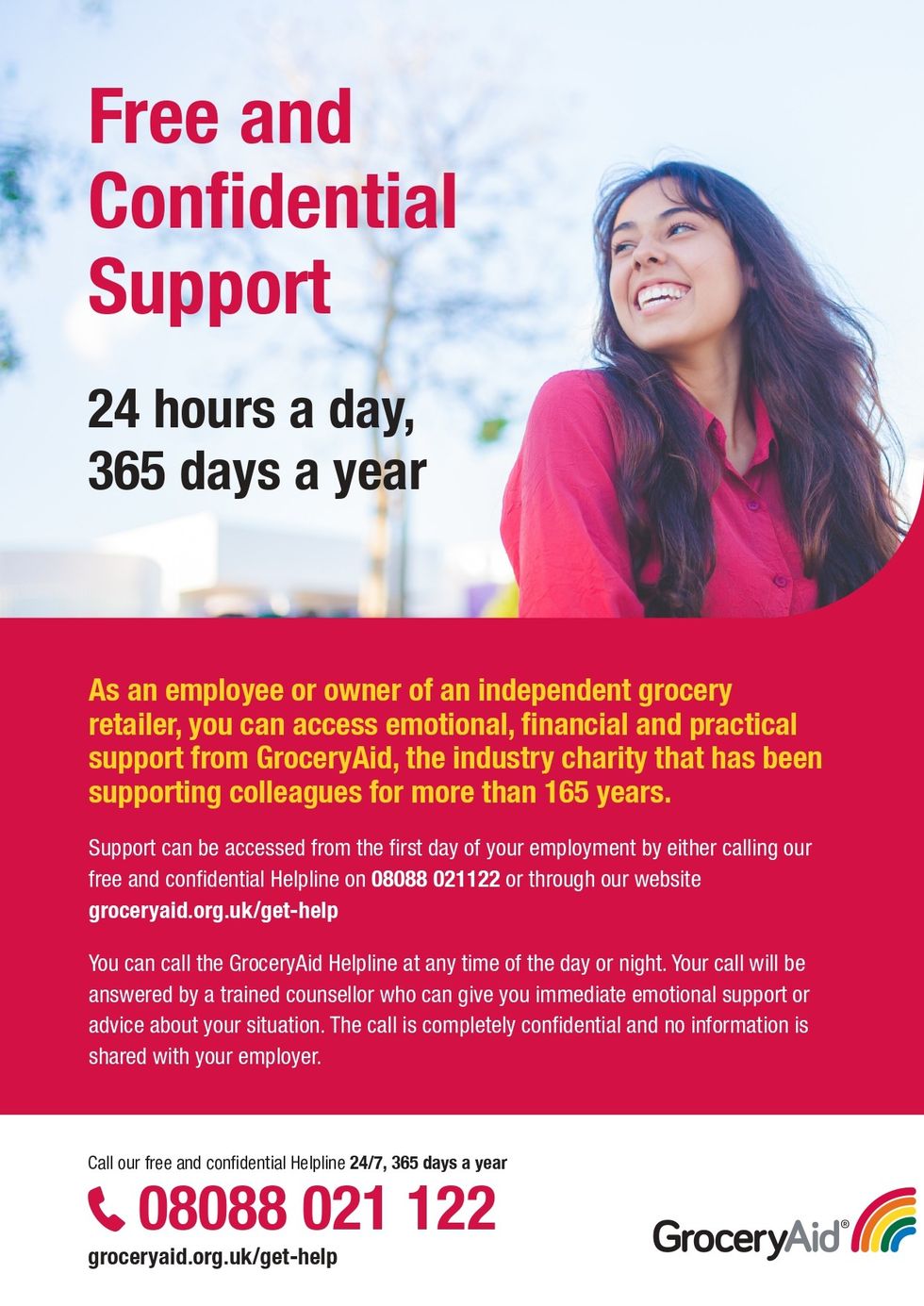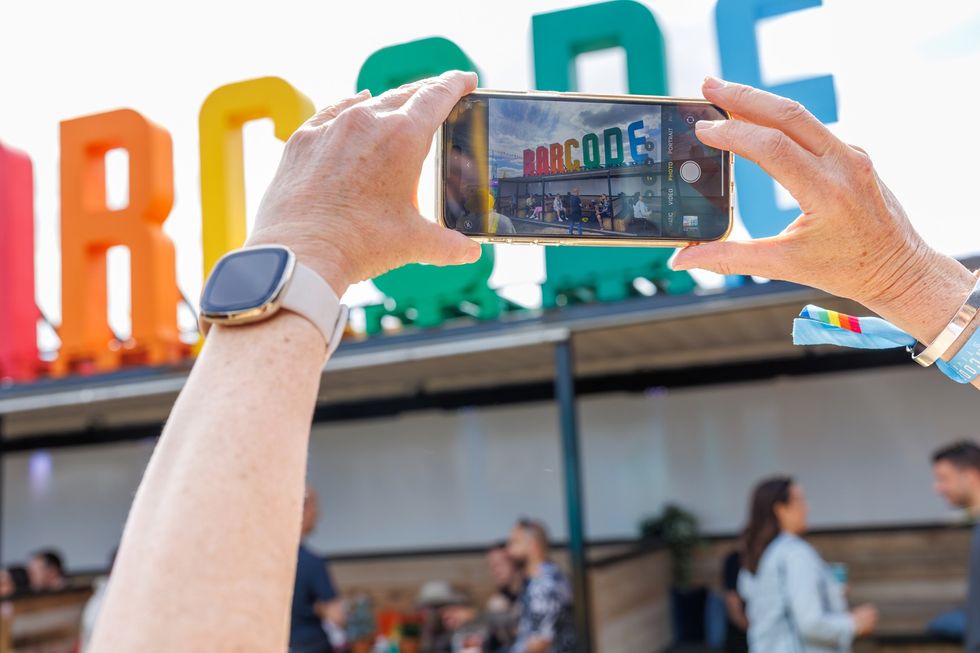GroceryAid, the UK's grocery industry charity, stands as a beacon of hope and support for those who stock our shelves, man our tills, and keep our supply chains running smoothly. As the charity celebrates another year of remarkable impact, Asian Trader sat down with Kieran Hemsworth, who last month completed his first year as CEO, to discuss GroceryAid's mission, achievements, and ambitious plans for the future.
Kieran Hemsworth's journey to the helm of GroceryAid is a story of industry experience meeting purposeful ambition. With a career spanning three decades in the grocery and FMCG sectors, Hemsworth brings a wealth of knowledge and a deep understanding of the industry's challenges to his role.
“I've had a long, long association with the charity. I've been going to GroceryAid events, probably for the last 30 years, ever since I was 24-25,” Hemsworth reflects. “Of course, it wasn't called GroceryAid then.”
Founded as the National Grocers Benevolent Fund back in 1857, the charity has combined with several other trade charities over the years, and changed its name from Caravan to GroceryAid in October 2012, following the merger with The Confectioners Benevolent Fund.
Hemsworth’s career in the industry began as a graduate trainee at Unilever, where he cut his teeth in marketing and sales roles over eight years. From there, he moved to Coca-Cola Enterprises, now Coca-Cola Europacific Partners, where he held several senior positions, including sales director for Grocery and Impulse and vice president of marketing for Northwest Europe.
He then went on to lead Ginsters, the Cornish pasty company, for five years as managing director, overseeing a significant brand relaunch. A stint at PZ Cussons followed, running the UK and Europe business of the Carex, Imperial Leather and Original Source maker. It was after this role that Hemsworth decided to pursue an MBA, a decision that would ultimately lead him to GroceryAid.
“Whilst I was doing my MBA, I thought, I just want to do something a bit more purposeful,” he explains. The opportunity to lead GroceryAid presented itself as a compelling way to give back to the industry he had been part of for so long. “I'd had quite a lot of interaction with the charity whilst I was at Coca-Cola. I was on the president's fundraising committee for about three or four years,” he adds, demonstrating his deep connection to the charity.
Despite his success as a senior executive, Hemsworth felt the need to broaden his knowledge base, leading him to pursue an MBA later in his career. “When you get to a certain level in an organisation, there are all sorts of trends that are happening, but you never have the time to properly get to grips with those trends,” he notes.
The year at Bournemouth University allowed him to dive into crucial topics like sustainability and digital marketing, trends that were becoming increasingly relevant in the grocery sector.
“I thought it was going to be easy, but it wasn’t!” Hemsworth admits, reflecting on the rigorous academic work required. “It was quite tough, but extremely rewarding, and I learned so much.”
A year of remarkable impact
Under Hemsworth's leadership, GroceryAid has seen remarkable growth in both its reach and impact. The charity last year provided 78,000 “incidences of support”, a staggering 93 per cent increase from just two years ago. This surge in demand has been met with a corresponding increase in welfare spending, now exceeding £6 million per year.
“It just goes to show how much of a need is out there for a charity that looks after the welfare of the people that work within grocery,” he says. “I think we'll spend £6.5m this year, but we could only match the level of demand out there thanks to the generosity of the people who support us as a charity.”
One of Hemsworth’s key realisations during his first year was just how much GroceryAid had evolved in recent years. “The welfare team have done an amazing job to change our offer, which was originally focused more on pensioner beneficiaries, to one that’s much more focused on the needs of grocery workers and their families,” he notes.
This shift reflects the growing recognition that grocery workers require comprehensive support, and GroceryAid’s support comes in three forms: financial, emotional, and practical. This holistic approach ensures that beneficiaries receive comprehensive assistance tailored to their specific needs.
Financial support includes grants for those facing sudden income drops due to factors like illness, relationship breakdowns, or housing issues. The charity also offers one-off grants with a specific remit, such as the cost-of-living grants and school essentials grants. “If you're on benefits and you work within grocery, you can apply for £150 per child grant to ensure that children go back to school with a new school uniform and new kit, which is great,” Hemsworth says.
To receive financial support, people should have worked in the grocery industry consistently for the past six months.
Emotional support is another crucial pillar of GroceryAid’s offerings. The charity provides access to trained counselors through its care line, offering up to six counseling sessions for those struggling with mental health issues. They have also partnered with charities like Relate, which offers counselling for relationship problems and Shelter, the housing and homelessness charity.
“If you phone up our care line, you'll speak to a trained counselor, and that trained counselor work out what's the best route for the help that it's required. So, if you've had a relationship breakdown, they will put you into somebody like Relate. If you've got an issue with housing, they will put you in contact with Shelter,” he explains.
Practical support rounds out the charity's offer. This includes access to specialists who can provide guidance on tax issues, financial problems, and even legal matters. “We will pay for people’s legal advice,” Hemsworth says, highlighting the breadth of practical support available.
Reaching the Independent sector
While GroceryAid has made significant strides, one of the ongoing challenges is raising awareness of the charity’s services, particularly among frontline grocery workers. “We did some research where we talked about the sort of services that we offer, and only 18 per cent of frontline grocery workers had heard of GroceryAid,” Hemsworth reveals.
This statistic is a driving force behind Hemsworth's ambitious vision for the charity. “Our vision is to help everybody within the grocery industry that needs us,” he states emphatically. “Now we think that is roughly 10 per cent of people who work in the industry. So instead of the 78,000 instances of support, we think actually what we should be helping is about 260,000.”
To bridge this awareness gap, Hemsworth and his team are approaching GroceryAid “a little bit like a consumer brand.” This involves not only leveraging their existing supporters to spread the word but also venturing into paid media on digital platforms, targeting frontline grocery workers through platforms like Facebook and Instagram.
A significant focus for Hemsworth and GrocryAid is expanding the charity's reach to independent retailers and their staff - a sector, often characterised by smaller operations and tighter margins, which can be particularly vulnerable to financial and emotional stresses. As he took the reins at the organisation last year, his immediate action was to launch a leaflet aimed at raising awareness among independent stores.
“Last year, from a financial grant perspective, we helped just over 650 people working in the independent sector, and we spent about £350,000 on financial support for them,” Hemsworth shares. “On the care line, we helped about 900 people who work in the independent sector.”
However, he acknowledges that this is just scratching the surface of the potential need. “If you take that as a percentage of the totality, it's not enough, and we want to grow it,” he says.
To boost awareness among independent retailers, GroceryAid offers free promotional materials. “If you run an independent store and you want to use our services, you can download from our website posters, leaflets and wallet cards to put up in store, we will send you all of this,” Hemsworth explains. “All you need to do is supply your name and address, and these services are open to everybody who works within your store. It's a great welfare offer for everybody.”
Independent retailers, often family-run businesses, face a unique set of challenges. The charity is careful to differentiate between personal financial struggles and business challenges. While the charity cannot provide direct financial support to save failing businesses, it does offer practical advice on managing business debt.
“Part of the practical offer that we have is how you manage small business debt and issues relating to the financial performance for a smaller business with advice,” Hemsworth notes. This practical advice can be a lifeline for retailers juggling both business and personal financial hardships, offering them a way to navigate their difficulties with professional guidance.
He also touches on a critical issue within any charitable organisation providing financial aid -ensuring that the support does not unintentionally enable harmful behaviors such as gambling. “We don’t like to turn people down, but we would turn somebody down if there is a high level of gambling, on the bank statements,” Hemsworth clarifies. In such cases, the charity signposts individuals to relevant addiction support services to help them address their underlying issues.
“There's a check, just to make sure that we're giving the right people the right sort of financial support, but also the right sort of emotional and practical support that go with that as well.”
Fundraising and celebration
GroceryAid's events play a crucial role in both fundraising and industry engagement. The crown jewel of these events is the Barcode Festival, which exemplifies the charity's growth and ambition.
"Barcode is just the most brilliant event,” Hemsworth enthuses. “The reasons why people go to Barcode is maybe slightly different from some of the other events that we run. More and more it's because people want to celebrate as a team, give a bit of reward and recognition as a team.”
Looking ahead, Kieran’s focus is also on scaling up GroceryAid’s events, particularly the Barcode Festival.
“If our vision is to try and help everybody, and we were successful in terms of growing the level of awareness, then I've got to increase the welfare budget to match that,” he notes.
Described as a day of celebration for the grocery industry, Barcode has outgrown its previous venue near The O2, which has a capacity of about 5000, and will be moving to a larger greenfield site at Kenwood House, in Hampstead, London, next year. This move will increase capacity to around 6,000 or 7,000 attendees, with potential for further growth in the future.
The festival serves multiple purposes, and increasingly as an opportunity for brands to showcase themselves in a unique, emotive way.
“In the last Barcode, we had over 1000 retailers there. So, it's a great opportunity to showcase your brand in an emotive way, rather than just talk with a presenter, do it in a proper way whilst everybody has enjoyed themselves as well,” Hemsworth explains.
But Barcode is just one of many events in GroceryAid's calendar. From challenge activities like coast-to-coast cycling and rowing across Lake Windermere to gala events with major retailers, each event serves to bring the industry together while raising crucial funds for the charity's work.
Focus on diversity
GroceryAid's commitment to the industry extends beyond direct support to workers. The charity also facilitates the D&I in Grocery programme, which aims to raise the level of diversity across the sector. With over 100 partners now participating, the program provides a platform for companies to learn from each other and drive positive change.
“It's a fantastic programme where the partners learn from the partners,” Hemsworth says. "Some of them a little bit further forward in terms of their D&I journey, but this gives a great opportunity for people who are not so far forward to be able to learn a huge amount from the other partners within the programme.”
The programme includes Learning Labs, mentor sessions, and a large annual live event, D&I in Grocery LIVE! This year's event, took place in early October, featured retail consultant and broadcaster Mary Portas as the keynote speaker.
For Hemsworth, the Asian retail community plays a vital role in the convenience sector, and he is determined to include their experiences in the D&I conversation. “We’re very pleased to have Asian Trader as one of our partners to ensure that representation,” he notes. “The whole programme is across the totality of the industry, and we need to make sure that we are covering everybody from that perspective.”
A message for Diwali
With Diwali just around the corner, Hemsworth offers a heartfelt message to retailers celebrating the festival of lights: “Have an amazing Diwali, but also remember your workers over this time as well. Please help us to get that message out, of our fantastic welfare services that are available to them.
“Sign up to the website, get the pack downloaded, drive that level of awareness of everybody working in your store, to make sure that they really understand that there is an industry charity here that's available to help them, should they fall into need, whether that is financial, emotional or practical.”
It’s a message that underlines the heart of GroceryAid’s mission - supporting those who keep the grocery industry running, day in and day out. By spreading the word and ensuring that workers know where to turn in times of need, Hemsworth hopes that more people will benefit from the lifeline that GroceryAid provides.
Diwali is a time of giving, a time to reflect on the spirit of kindness and community. What better way to embody that than by ensuring your staff are aware of the support available to them through GroceryAid.
| The application process |
| For those seeking support from GroceryAid, the process is designed to be as straightforward and supportive as possible. CEO Kieran Hemsworth walks us through the steps: “If you're suffering that sort of temporary drop in income, in terms of if somebody in the house is ill and you have to reduce the number of hours that you're working, or there's a relationship breakdown or a housing issue, the best thing to do is to go via our website groceryaid.org.uk.” From there, applicants can find information about available grants and how to apply. The website offers a live chat option and a phone number [08088 021 122] for those who need assistance with their application. The application process is designed to be comprehensive but compassionate, considering the applicant’s financial situation, such as savings and bank statements, to ensure the right support is provided. GroceryAid's caseworkers guide applicants through the process, ensuring they receive the most appropriate support for their situation. “The approach from the welfare officers is often the case that we get people applying for like a cost-of-living grant, which is quite a low-level grant, and when they casework it with the individual, they will find out there's another opportunity to apply for an even bigger grant,” Hemsworth explains. “Also, depending on the issue, they will signpost the other services that we can offer as well, so either the practical support that's required to go with it, or any emotional support that's required to go with it. So, it's a more holistic process in terms of what we offer.” |





